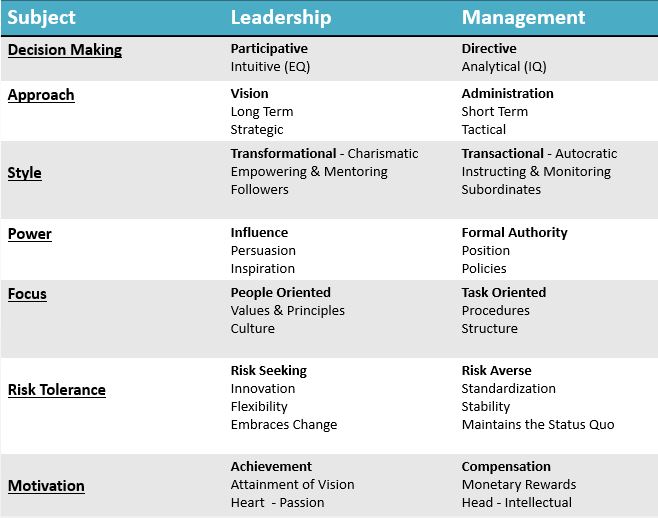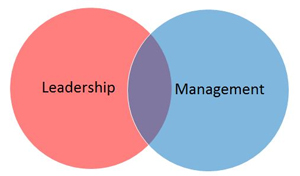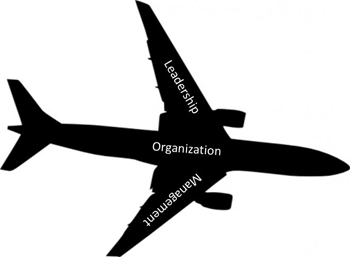When Frederick Taylor began his studies in Scientific Management, he used a stopwatch to track productivity with the goal of improving performance. The manager’s function in Taylor’s day was the one who took control to ensure productivity and profit. For most of the 20th century management was the main item on the agenda. Many universities and companies developed in-depth management training programmes. However, people were taught little about leadership. Today it seems the scale is lopsided once again, this time with more emphasis being placed on leadership. Everyone wants to be categorized as a leader.
Leadership vs. Management - What’s the Difference?
The terms "Management" and "Leadership" are often interchanged. In fact, many people view them as basically the same.
Leadership is the ability to influence a group toward the achievement of goals. Management on the other hand, is the use of authority inherent in designated formal rank to obtain compliance from organizational members. It is the set of processes that keep an organization functioning.
- Management is a science which can be learnt and taught
- Leadership is an art.
- Management is a function whilst leadership is relationship
- Leadership is about getting people to understand and believe in your vision and to work with you to achieve your goals.
- Leadership is largely situational. Leadership seems to emerge when a situation emerges that demands someone to take the helm.
- One key distinction between management and leadership is that we manage "things" and lead "people."
“If you want to build a ship, dont drum up the men to gather wood, divide the work, and give orders. Instead, teach them to yearn for the vast and endless sea.”-Antoine de Saint-Exupery

The two concepts are indeed quite distinct and understanding differences between “leadership” and “management” can ensure you see where you can improve and not assume you are simply good at both. By contrasting them and understanding their differences we can better balance and develop these essential roles.
Decision Making - Participative vs. Directive
Leadership - "follow me into the battle." Leaders show how it is done and back up their team with the support to help them succeed. They thrive on engagement.
Management - "now you go ahead as discussed and planned." Managers delegate and assign duties while leaders actively participate.
Managers tell "how."
Leaders lead by example through their own actions.
Managers speak “me.”
Leaders speak “we.”
Leadership is a team game & true leaders make great team players because of their ability to understand and connect with people around them.
True leaders lead from the front rather than pushing from behind. They inspire their team through negotiations and discussions, always welcoming feedback. They are intuitive rather than analytical which many managers are.
Managers are required to have experience and formal academic qualifications but for leaders this may not necessarily be a pre-requisite.
Great Leaders possess high Emotional Intelligence (EQ). They are good at assessing others emotions and use this to facilitate thinking and creativity whereas managers may rely mainly on analytical reasoning (Intelligence Quotient - IQ), to solve problems. Its been extensively documented that EQ skills are more of an indicator of success than IQ skills in todays business environment.
Managers often depend on complete data reports in decision making as they are required to justify their actions. Great leaders have the ability to make good decisions without securing all the information needed. They know how to leverage information and resources to achieve their goals.
Read More
2. Approach - Vision vs. Administration
Leaders are focused on the mission and are interested in the big picture. Managers are accountable for the present. Leaders are accountable for the future. Managers organize and plan to meet this year’s objectives. Leaders create a vision of the years down the road that will change the course of history.
Management centres round the action of planning, organizing and efficiency while leadership is the abstract creation of vision and strategy. The manager asks how and when; the leader asks what and why. Leadership defines what the future should look like, aligns people with that vision and inspires them to make it happen despite the obstacles.
Managers place emphasis on details. Great leaders are strategic thinkers who have the ability to translate their vision into an actionable strategy to ensure its success. They are solution focused while managers are problem focused.
Leaders focus on where they are going; the outcome. Managers usually focus on how best to get there; the process to reach the outcome. In reality Leaders are architects whilst Managers are the construction experts.
3. Style - Transformational vs. Transactional
A leader is chosen by his team whilst a manager in most cases chooses his team.
A manager relies on control; a leader relies on trust. They trust their team to deliver and their team trusts their leadership. Leaders focus on team building. They coach individuals to grow and expand. Dictating through an autocratic management style will not win the hearts and minds of individuals so leadership plays an important role in leading and motivating the teams to achieve those new limits.
Leaders build people through training, coaching, mentoring and rewarding. They recognize that everyone is motivated differently. Managers on the other hand believe people will be motivated if you pay them enough. Leaders understand that pay is a satisfier and not the only motivator.
Leaders openly praise and reward their team for good work whilst managers prefer to take the credit for themselves. Leaders are good at making you feel you are important. Bosses make you feel they are important. Managers try to be heroes. Leaders make heroes of everyone around them. They celebrate with their team.
Leaders know how to manage a myriad of intense personalities and get them going in the same direction even if they don’t like each other.
Managers direct groups. Leaders create teams. They surround themselves with talented individuals and are not intimidated by their skills or knowledge base. They build strong relationships and ensure their team is well balanced. They embrace succession planning- developing leaders rather than just more followers.
4. Power - Influence vs. Formal Authority
Leaders command respect. Managers demand it. The term “manager” means you are a steward, custodian of someone else’s belonging. Managers are the instruments of corporate policy whereas leadership is selling a vision that you require others to buy into.
Managers in many entities represent an authority system or position. They excel in figuring out the best way to control their team to complete tasks. Leaders inspire people to do the tasks. They inspire their teams to cross their limits. A manager acts within the confines of his job description. Managers are given tasks and instructions to follow from above and relay it down (distribute it to get it done). Leaders make their own decisions.
Great leaders possess great interpersonal and communication skills. They are good listeners. They keep their team informed of all aspects of the journey. They tend to be people centric and understand the concept of servant leadership (customers and team).
They lead by serving as opposed to intimidating. They thrive on finesse and subtlety to get the job done. Managers have the authority to tell others what to do. While leadership is about setting a good example and encouraging others to follow, people follow you because they want to.
“Leaders put a fire in people while managers put fire under people.” - Kathy Austin
5. Focus - People Oriented vs Task Oriented
Managers get results in spite of the people. Leaders get result because of the people. As one employee stated,“Managers only get my best because of the expectations I have set for myself, not for them.”
Managers sometimes set targets that are unattainable to their team. Leaders aim at making people reach their true potential.
Management is monitoring KPI’s, numbers and spreadsheets. A manager is interested in the bottom line. A leader is interested in his / her followers (the people who will deliver the process that leads to the bottom line). Management is basically concerned with arranging the processes, persons and materials. Management creates an outline to follow. It focuses on process improvement and operational excellence. It is a structured function with a set of processes required to manage the business activities of the day to day operations. It is administrating to ensure things get done whereas leadership is inspiring that implementation.
Managers emphasize systems more than people and can be “cut” and “dried” in their work relations. They easily see milestones and deadlines. Leaders invest their time in developing people. They think about the people and their talent as if they were investment opportunities. Leaders focus on getting to know their team.
Great leaders often place great importance on ethical values. They choose to do “what is right”, even if it is difficult.
“Management is efficiency in climbing the ladder of success; leadership determines whether the ladder is leaning against the right wall” - Stephen R Covey
6. Risk Tolerance - Risk Seeking vs. Risk Averse
Leadership is about change. Leaders innovate, develop and invent whilst managers maintain conformance to existing standards. They “go by the book.” Leaders set new direction as their focus is on creating new paths. They take people to places they have never been. Managers keep them in place.
Leaders colour outside of the lines whilst managers colour inside of the lines. Leaders seek to ensure the business model is in alignment with the ever changing environment (consumer tastes, technology, social attitudes...etc). They are proactive rather that reactive. They anticipate and lead change.
Managers are trapped in the confines of the box within the system. If managers overstep their bounds and attempt to revolt against the existing culture, they may soon find themselves out of the job. This was sadly the fate of my esteemed Manager Ed who received the boot - The Memorable Leader.
Leaders are committed to both personal and professional success. They are continuous learners always looking for better methods, different approaches and increased velocity. Leaders challenge the conventional routine, systems and people to bring out the best in them. They live on their own principle and convince others to follow the same.
Some of the best managers are very good at studying best practices – ways to build a “better mouse trap” to improve performance and efficiency.
Effective leaders are creative in their approach, developing new ideas to resolve current issues and implementing them effectively to prevent future recurrences.
“Management is doing things right; leadership is doing the right things.” - Peter Drucker
7. Motivation - Achievement vs. Compensation
Being a manager is a job, you implement the practices of the organization. Being a leader is a role, you guide, inspire etc. Their fulfillment comes in bringing about positive change. A good leader puts the interest of their followers before their own; they measure success by whether their followers are better off.

Leaders help organizations and people to grow whilst managers’ greatest accomplishment comes from making work processes more effective. Leadership breeds loyalty, dedication and accountability. Leaders inspire, motivate and influence their teams and assist them in reaching goals and highest possible performance. Leaders put the team before their personal aspirations. Leaders are passionate about their causes and are willing to risk all for the fruition of the same. Managers are paid to get things done.
As time passes on Managers are forgotten but Leaders live on in the hearts and minds of their followers long after they have gone.
Taking the Next Step towards Leadership
It’s not impossible for a manager to become a leader. Sometimes it just takes being aware of what they need to do to fulfill their responsibilities as a leader. Managers can become effective leaders by adopting the following.
1. Vision – Focusing on the long term vision, the big picture. Leadership is about reducing fear and increasing hope.
2. Integrity – Good leaders are honest, fair and trustworthy.
3. Team Building – Creating a climate that encourages and values the contributions of team members. Show that you genuinely care.
4. Communication – Good communication skills is essential for effective leadership. Always keep your team informed. Be open and honest. Listen with the intention of understanding and welcome feedback.
5. Inspiration – Inspiring and motivating others to be all they can be.
6. Continuous Learning – Successful leaders strive for ongoing personal development. Developing leadership skills is a lifetime project.
7. Humility – Don’t think you are too high up the hierarchical ladder to get involved. Aim to serve rather than be served (servant leadership).
8. Relationship Building – Spend time with and get to know your team. The most effective leaders build their relationships through trust.
9. Risk Taking – Don’t be afraid to do things differently; to develop new pathways. Welcome new ideas and embrace creativity.
10. Reward and Recognition – Acknowledging and appreciating each team member’s contribution and giving meaningful rewards is essential to keeping them happy.
Are all Leaders Managers?
Many people believe that being a good leader automatically means you’re a good manager and vice versa. Sometimes great leaders aren’t able to effectively manage people because they’re thinking too macro and not enough micro.
Don’t assume that someone who has a proven track record in leadership or management automatically possesses the other skill. Leaders don’t always make good managers. It is a rare individual who excels in both of these things. Both however are critical to success in a high growth business.
Conclusion
The world is littered with companies that had visionary and inspirational leadership but failed to execute due to a lack of competent management.
For example, entrepreneurial start-up companies often have strong vision, passion and energy (leadership) and may also have good technological or technical skills. But their lack of systems and processes (management) leads to a decline of the organization. A lot of entrepreneurs are leaders and not managers.
Naturally leadership is ahead of management. A well balanced organization has leadership at its base. Many of the world’s greatest leaders do not function with a formal title or within the confines of an established organization.
“Leadership is an art of accomplishing more than the science of management says is possible.” - Colin Powell
In this time of economic uncertainty, technological advancement coupled with the increasingly complex and volatile business environment, the need to demonstrate both leadership and management in perfect situational correlations has never been more critical for success, than now. The two go hand in hand and there has never been a time in history when individuals that possess a blend of both leadership and management skills are more in demand than today.
The great need for charisma and inspiration is a must but equally systems must be monitored and controlled to ensure tasks and road maps are created to drive towards the vision, which is normally achieved through the management function. Without efficient management skills the direction set by a leader risks being unsustainable.

In building our businesses we need to harness our passion and creative spirit with disciplined processes. For an organization to achieve strong results, both leadership and management need to be present. With good management and poor leadership the team will lack the inspiration and passion to pursue goals. How an organization strikes balance between management and leadership depends on the circumstances, the people and the environment in which it operates.
Being able to blend these two styles is truly a unique skill set. Keep in mind there is an abundance of managers in the world but very few embody the characteristics of leaders.
Therefore, both management and leadership are needed just as the right and left wing are both essential in an airplane’s flight. Although there will be high turbulence, passenger disruptions and the need to alternate between altitudes, both leadership and management are required to steer the organization to a successful landing, thereby reaching its projected destination in an effective and efficient manner
Source : Linkedin